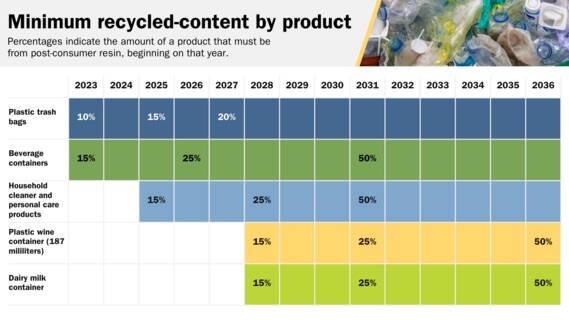Submitted by the Washington Department of Ecology
You can find plastic trash everywhere. It’s one of the most common items in roadside litter. Plastic bottles and containers end up in our lakes and rivers, and plastic refuse mars our parks and public spaces. Moreover, the fossil fuels that go into making these products contribute to climate change.
New regulations from the Washington Department of Ecology will help to address some of those problems by increasing the amount of plastic that gets recycled and reused to make new plastic packaging.
Companies that sell drinks, milk, wine, trash bags, personal care products, and household cleaners must include more recycled plastic in their packaging, according to the new rule.
“You don’t have to look very hard to see that we have a plastic problem – plastic containers are among the most common items we find in roadside litter,” said Ecology Director Laura Watson. “This rule will help us reduce pollution, increase the value of our recycling, and make sure that we’re doing everything possible to keep Washington beautiful and litter-free.”
Since January, companies that make trash bags and beverage containers have been required to make their products with at least 10% and 15% recycled content, respectively.
The requirements gradually increase over the next 12 years, and expand to include plastic packaging for other common products. By 2036, most plastic packaging will be required to contain at least 50% recycled content.
A graph showing the increase in recycled material in plastic containers over the next 12 years.
Every year, companies must comply with the requirements, report, and pay fees based on the weight of plastic they sell into the state.
Increasing recycled content in plastics is the latest step in implementing a 2021 law passed by the Washington Legislature, aimed at reducing the use of single-use plastics. The law banned single-use plastic bags as well as foam packing peanuts and takeout containers. It also restricted the use of throw-away plastic takeout items at restaurants and lodging establishments and set new standards for recycled plastic content.
“Plastic pollution is ugly, harmful, and expensive to clean up,” said Peter Lyon, manager of Ecology’s Solid Waste Management program. “Using recycled plastic to make new products is the sustainable thing to do, and it cuts down on harmful greenhouse gas emissions.”



